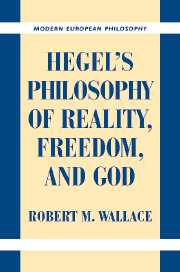Book contents
- Frontmatter
- Contents
- Acknowledgments
- Publication Citation Style
- Preface
- 1 Introduction
- 2 Naturalism, Plato, Kant, and Hegel on Reason, Freedom, Responsibility, Ethics, and God
- 3 Reality, Freedom, and God (Science of Logic I)
- 4 Identity, Contradiction, Actuality, and Freedom (Science of Logic II)
- 5 Freedom, God, and the Refutation of Rational Egoism (Science of Logic III)
- 6 Nature, Freedom, Ethics, and God (The Philosophy of Nature and the Philosophy of Spirit)
- 7 Conclusion
- Index
- Frontmatter
- Contents
- Acknowledgments
- Publication Citation Style
- Preface
- 1 Introduction
- 2 Naturalism, Plato, Kant, and Hegel on Reason, Freedom, Responsibility, Ethics, and God
- 3 Reality, Freedom, and God (Science of Logic I)
- 4 Identity, Contradiction, Actuality, and Freedom (Science of Logic II)
- 5 Freedom, God, and the Refutation of Rational Egoism (Science of Logic III)
- 6 Nature, Freedom, Ethics, and God (The Philosophy of Nature and the Philosophy of Spirit)
- 7 Conclusion
- Index
Summary
In conclusion, I will restate the implications of Hegel's account of freedom – or of true infinity or the Concept or Spirit – for each of the main issues to which he applies it. For a full explanation of each of these implications, the reader should turn back to the relevant parts of the previous chapters, but a summary will be useful.
1. With regard to the duality of desire or inclination versus reason, Hegel argues that finite desire or inclination must go beyond itself, via the “Ought,” in order to achieve “reality” for itself. But this going beyond itself, on the part of finite desire or inclination, constitutes reason, properly understood (see 5.7). Rather than being the polar opposite of desire or inclination, then, reason is the self-surpassing of desire or inclination; and thus reason is “with itself” in its “other” (that is, desire or inclination), so that each side, rather than being limited and made finite by the other, is free.
2. Hegel treats the duality of human being versus divine being in the same way. God – Absolute Spirit – is not the polar opposite of humans, since that would render God finite, like us. Rather, God is the self-surpassing of humans (and, to varying degrees, of everything else in nature, as well). This does not reduce God to “us,” since it is only by our surpassing ourselves that we become fully real – so we become fully available, as something to which God could be “reduced,” only by going beyond ourselves, and becoming God.
- Type
- Chapter
- Information
- Hegel's Philosophy of Reality, Freedom, and God , pp. 319 - 322Publisher: Cambridge University PressPrint publication year: 2005



